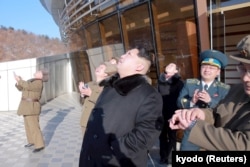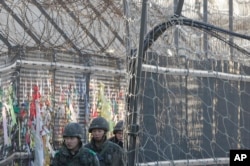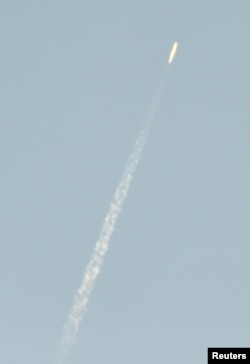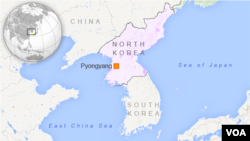The U.N. Security Council has strongly condemned North Korea’s launch of a long-range rocket on Sunday.
The rocket, carrying what Pyongyang said was a satellite, was launched from North Korea’s Tongchang-ri satellite launching facility near the northwestern border with China.
In a rare Sunday session, Security Council members met behind closed doors for 90 minutes to discuss the next steps for dealing with the defiant Asian nation.
Afterward, Venezuelan Ambassador Rafael Ramirez, who holds the Security Council presidency this month, read a statement from the council.
He said this launch, “as well as any other DPRK launch that uses ballistic missile technology, even if characterized as a satellite launch or space launch vehicle,” which contributes to Pyongyang’s “development of nuclear weapon delivery systems” is a “serious violation” of Security Council resolutions dating back to 2006.
The council said it is ready to “develop significant new measures” in response to North Korea’s nuclear test of January 6, 2016 and Sunday’s missile launch.
The council has imposed four rounds of increasingly stronger sanctions on North Korea in response to various nuclear and ballistic missile tests it has conducted since 2006.
“By now it is pretty clear that the existing sanctions have not stopped North Korea from developing nuclear weapons and delivery system further,” said South Korean U.N. Ambassador Oh Joon.
WATCH: U.S. Ambassador to the U.N. Samantha Power
‘Tough, Unprecedented Measures’
“There can be no business as usual,” U.S. Ambassador Samantha Power told reporters. She said a new resolution must be quickly agreed to with “tough, unprecedented measures, breaking new ground here,” and “exceeding the expectations of Kim Jung Un.” A reference to North Korea’s leader.
China’s envoy, Liu Jieyi, agreed that a new resolution is necessary, but he did not indicate how tough Beijing is willing to be.
“A new resolution that will do the work of reducing tensions, of working toward denuclearization, of maintaining peace and stability, and of encouraging a negotiating solution,” Liu told reporters.
Russian envoy Vitaly Churkin said a new resolution must be “weighty,” but “reasonable.”
“We believe we should not be looking at an economic collapse of the DPRK, we should not be of course looking toward some actions that would further heighten the tensions on the Korean peninsula and around it,” he said.
‘Totally Outrageous and Unacceptable’
Ambassador Oh said North Korea’s actions are “totally outrageous and unacceptable.” He said Sunday’s launch would have cost close to $1 billion, which “would have fed the entire North Korean population for a whole year.”
Many North Koreans live in poverty and face severe food shortages. Government spending is directed toward military programs, and the country receives international humanitarian aid. Last year, the United Nations appealed for over $100 million to fund food, agriculture, health, water and sanitation programs.
Japan’s U.N. envoy, Motohide Yoshikawa, who along with the United States and South Korea called for Sunday’s session, said the time for dialogue is over and more pressure is needed in the form of a “robust” Security Council resolution to stop Pyongyang.
For the past month, council members have been considering details of a U.S.-drafted sanctions resolution in response to North Korea’s January 6 nuclear bomb test.
Venezuela’s envoy said “everybody knows we are waiting for the agreement between two countries” on that text.
The two countries are the United States and China.
China has urged more dialogue with its rogue ally, while the United States and other nations want tougher international measures.
Increased sanctions
The U.S. Congress is working on unilateral sanctions legislation that would target third parties companies and banks, many in China, that do business with North Korea.
South Korea is reportedly considering closing the Kaesong Industrial Complex in response to the rocket launch. The jointly run Kaesong project, that employs more than 50,000 North Koreans, is the last surviving inter-Korean development program. Virtually all other inter-Korean ties and assistance programs were severed in 2010 after South Korea accused the North of sinking a navy warship and killing 46 sailors.
China support
For sanctions to be effective China’s support, as the North’s chief benefactor and trading partner and as a permanent member of the U.N. Security Council, is considered essential.
But Beijing has been reluctant to support harsh punitive measures on North Korea.
Pyongyang says its’ nuclear weapons program is necessary for national defense and non-negotiable.
In early 2009 Pyongyang withdrew from “six party talks” with Washington, Seoul, Tokyo, Beijing and Moscow to dismantle its nuclear weapons program in exchange for economic assistance and security guarantees.
Sunday’s launch occurred in the first hours of an accelerated February 7-14 launch time frame Pyongyang announced Saturday. Earlier it had alerted international meteorological and telecommunications agencies the launch would take place February 8-25.
Technology
North Korea is believed to be working on miniaturizing a nuclear warhead to mount on a missile, but many experts say it is some time away from perfecting such technology.
The reclusive state is believed to have over 1,000 Soviet model missiles that can reach targets in South Korea and Japan, and enough plutonium to make eight to 12 nuclear bombs.
Last year U.S. military authorities said they believe North Korea has the ability to miniaturize a nuclear warhead to fit on a KN-08 long range missile, although North Korea has not yet demonstrated this capability.
Youmi Kim in Seoul contributed to this report.




